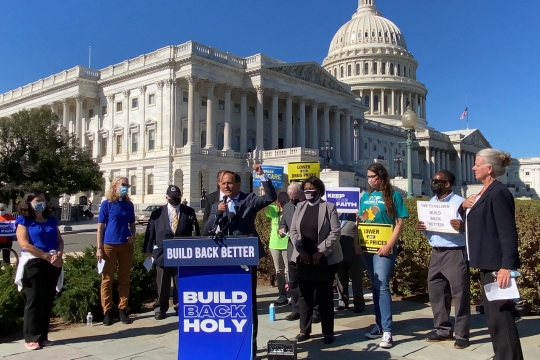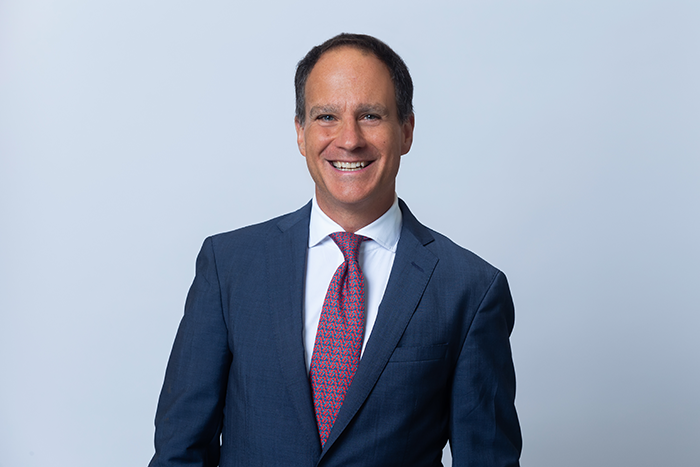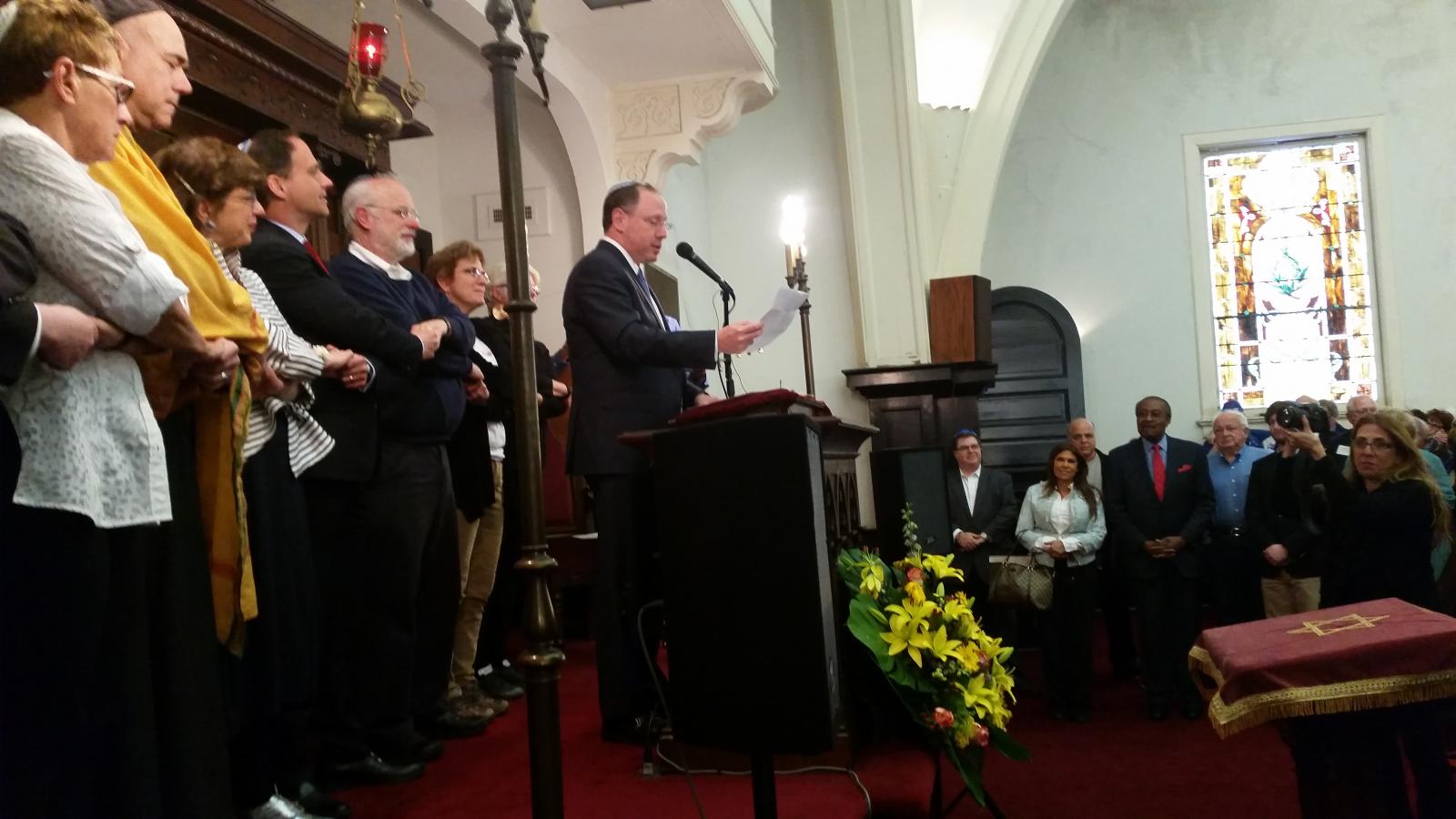
Rabbi Aaron Panken understood his call to be the creation of an entire generation of inspiring leaders who would lead the Jewish people to fulfill our destiny. He was nurtured and trained by the same institutions of Reform Judaism – NFTY - The Reform Jewish Youth Movement, the Central Conference of American Rabbis, the Union for Reform Judaism, and most of all the Hebrew Union College - Jewish Institute of Religion – to which he devoted his professional life. And he did so because he understood the profound role of leadership in building a sacred community.
Like many of you, I knew Aaron by his formidable reputation as a Jewish leader, before I actually met him. For me, it was 36 years ago when I joined CRaFTY, the NFTY region in New York City, as a ninth grader. Aaron was the immediate past-president of CRaFTY, and though he was miles away physically at Hopkins, his mythic presence as a true rock star of teen leadership ensured that whenever he would return, we felt like we were in the presence of someone even cooler than Phil Collins or Billy Joel. It was the 80s.
In the 40 years since Aaron started his leadership Journey, demanding religious education as a teenager, as so many of you in this room experienced personally, he lived by the highest ideals of Jewish communal life. Among his many gifts was a deep and rigorous grounding of his work in Jewish sources. He wrote, in a 1997 essay for a UAHC guide to college students:
“As we study ancient texts, we bring new life to them from our modern perspective, just as their ancient wisdom brings new life to ourselves.”
So, let us remember Aaron as he would have us do so: going back to the text, and along the way, let’s have his interpretation be our guide.
Korach, the parsha we read this week, offers a cautionary tale about those who make claims on communal leadership, but are actually motivated by selfishness and personal gain. The rabbinic literature on Korach sheds light on why Aaron was such a great leader himself and affirms the vision he had for the College-Institute and for our movement.
Korach challenges Moses leadership in the wilderness, making the seemingly compelling claim: “You have gone too far! For all the community are holy, all of them, and the Eternal is in their midst. Why then do you raise yourselves above the Eternal’s congregation?” There follows a fairly intense confrontation between Moses and Korach, which to summarize briefly – doesn’t go well for Korach and his followers, who wind up consumed by fire and swallowed up by the earth.
The earliest rabbis reject the false piety of Korach – in a text that many of us learned from Rabbi Aaron Panken, Mishna Avot 5:17, in which the rabbis taught:
“Every argument that is for the sake of heaven, is destined to endure. But if it is not for the sake of heaven, it is not destined to endure. What is an example of an argument for the sake of heaven? That of Hillel and Shammai. What is not for the sake of heaven? That of Korach and his entire community.”
Aaron used to teach this to synagogues presidents and others as a foundational text for Jewish life and leadership, urging that we foster dialogue like Hillel and Shammai, who debated rigorously, but always for the sake of a higher purpose.
The rabbis teach that Korach’s dispute was not “Leshem Shemayim” for the sake of heaven – but rather for his own personal advancement. The Malbim, a 19th century commentator points to the fact that the Mishna refers to the argument between Korach and his entire community, instead of saying between Korah and Moses as we might expect, to show that Korach and his followers were fighting among themselves, all vying for personal gain in trying to unseat Moses and Aaron. Strengthening the argument, the great modern commentator, Nehama Leibowitz points out that in the Torah text one would expect Korach to say, “all the congregation is holy,” as one unified people, but he says, “all the congregation are holy.” She argues that Korach sees the community as self-interested individuals, with personal ambition that overrides the divine mandate to be “a kingdom of priests and a holy nation.”
Aaron Panken embodied, modeled, and taught the communal model of leadership the rabbis drew from our text. Of course, the entire community can be holy; but those worthy of leadership place the common good above personal ambition. True Jewish communal leaders – especially rabbis then and now – rigorously engage in debate, but for the sake of heaven. All of us who had the privilege of working with and learning from Aaron know that all that he did was “Leshem Shamayim,” for the sake of heaven.
As I contemplated how best to honor Aaron’s memory, and we reflect on his legacy in our lives and for our movement, I studied Aaron’s own words, particularly what he wrote and taught us about remembrance. In one particularly poignant essay, Aaron pointed out the irony that just at the moment when prominent, public people die and are silenced, their voices are often heard the loudest – as they are quoted, replayed, and – as he said – “make more noise than ever.” In this d’var Torah, as with much of the writing about him over the last month, let’s have Aaron’s voice make some noise.
In the same essay, written shortly after the death of his mother-in-law, Daryl’s mother – Aaron reflected on the contemporary phenomenon of hearing the words live on of people through voice mails they left before their deaths. He called these encounters “jolts of memory” that remind us of what our loved ones meant to us in our lives and even more so, what they represent in death. In a stroke of homiletic brilliance, Aaron related those “jolts of memory” to the Vidui prayer we say on Yom Kippur – confessional, or literally “declaration” of mistakes we made, calling us to account and pointing us toward a “brighter future if we will only listen carefully.” In Aaron’s case, we are blessed with recordings of his teaching that will act as Vidui-like declarations, calling us to our conscience and holding us to account. Let us listen carefully.
Aaron entitled another essay “May God Remember,” for the formula of the Yizkor prayers we read on Yom Kippur. He notes that in the traditional formulation, we shift from the personal remembrance of our loved ones, to a plea that God remember them, a concept worth parsing. He noted that in the Torah, God “remembers” four times: Noah after the flood, Abraham (and his nephew Lot) after the destruction of Sodom, Rachel who yearned to birth a child, and the Hebrew slaves. Quoting the great Nahum Sarna, Aaron pointed out that in each case God’s “remembering” led to action – culminating with our redemption from slavery. Aaron ends the essay with a startling call to action for us:
“Thus, remembering becomes more than a simple mental act; it focuses divine attention on individuals and collectives who need deliverance from pain and destruction, thereby ensuring that Jewish history continues as God intends. …the implication is that this act of remembrance also constitutes a guarantee of Jewish continuity – well beyond just those who we remember, and far beyond us as well. In remembering and asking for God’s remembrance, we request divine help in continuing our people’s trajectory beyond ourselves, to achieve the ultimate aims of our people’s history.”
Let us be stirred by Aaron’s call that remembrance lead to action and let us not underestimate the full force of his argument. He isn’t satisfied with Jewish continuity – no he goes on to call for God’s help in “continuing our people’s trajectory beyond ourselves, to achieve the ultimate aims of our people’s history.” It isn’t surprising then, that nearly 36 years after we first met, with countless interactions since, in 2015, Aaron and I encountered one another in our new professional roles – his as the President of the College-Institute, and mine as the director of the Religious Action Center – in Selma Alabama, for the 50th anniversary commemoration of Bloody Sunday.
For Aaron, there was (and is) a direct line from God’s remembering the Hebrew slaves, through our own remembering of our history, to our “trajectory beyond ourselves.”
That day in Selma he said:
“We remember the period’s frightening moments when unabashed hatred battered the good and robbed people of life and opportunity; when authorities who we looked to for leadership, morality and fairness used their immense influence for evil and not for good, and when the powerless suffered mightily at the hand of those who held them down. And yet, it was a time when undaunted courage and deep commitment rose up to conquer ignorance and prejudice; a moment when what appeared to be impossible, became possible though the concerted actions of a committed fearless community of seekers of justice who would not desist until hard won freedom and equality became reality.”
Aaron closed his remembrance in Selma with a call to action, and a mandate for the College-Institute, if not for the entire Reform Movement and all the Jewish people, which is even more relevant today than when he first issued it three years ago. He referenced Dr. King who wrote that Judaism’s strength was an integration of education and social action, and then in his own words he said:
“Let us on this day of commemoration, commit ourselves anew to learning and leading for justice, to raising up a new generation of educated leaders who will strengthen knowledge and who will continue to lead our Jewish community once again into the forefront of changing this world for the better.”
Now let’s be clear – Aaron meant it.
As an example, last summer, he came to the RAC to conduct a teach-in for dozens of rabbis on immigration in Jewish text and tradition, so they could ground their work on immigrant justice in enduring Jewish values. His teaching will be captured in an anthology that will be published later this year by the CCAR. After a thorough exploration of a range of biblical and rabbinic sources, and thoughtful consideration of alternative perspectives, he wrote the following:
“Suffice it to say that Jewish tradition demands that we prioritize the needs of immigrants, welcoming and helping them when we can, balanced with the needs for security and safety in our own nation. Yes, we should remain obedient to the law of the land, but we must be unafraid to confront it and, potentially, to violate it if necessary, when real lives are at risk. Obligations arise from history, and we who have been slaves and strangers, wanderers and outsiders, simply cannot be silent in the face of persecution and hatred rendered onto others.”
“We must surely be judicious with the jewel of citizenship, but we must also be committed to protect the world’s most vulnerable and offer them life, liberty, and safety. The very word ‘Hebrew’ (Ivri) comes from a root for “those who cross over” from one place to another, quintessential immigrants from the start. If this is our essence, how can we not stand up for those who walk these paths in contemporary life?”
Always intellectually rigorous, and deeply grounded in a thorough reading of the sources, Aaron was willing to speak truth to power. In an open letter to the new administration and the 115th Congress, Aaron referenced the classic rabbinic maxim, that one who destroys a single life has destroyed an entire world, and he wrote:
“This gets to the core of what it means to govern a nation in which all citizens are created equal. In the decisions you make, you must take into account each and every human being affected by your words and actions. This ancient text reminds us of the manifold ways that people in power and the policies they create can destroy the lives of others: by denying them health care, tearing apart their families through wanton deportation and travel bans, polluting their environment, negating their humanity, or downgrading their education. Each of these acts is tantamount to the destruction of the whole world.”
Let there be no doubt that Aaron wanted much more from the leaders he was training than simply to preserve Jewish continuity; he understood that like Moses, Aaron, and Miriam, the mantle of Jewish leadership is the obligation to realize our role in history.
So, let us close by humbly returning to the core rabbinic teaching of Korach, which Aaron explicated so well: Only those arguments for the sake of heaven endure. Reasonable people can disagree about how to apply Jewish wisdom to a range of contemporary issues. Aaron taught me and all of us – above all else, to debate with civility and act with humility.
The Hebrew of our text provides one final note of reassurance: the phrase “sofah kayemet” translated as “endures,” literally means: “its end continues.” This is a seeming oxymoron – how can an end continue? Perhaps we find the answer in Aaron. His death – his end on this earth – all that he did which was for the sake of heaven – will endure through the deeds of all the leaders his life’s work inspired – and echo across eternity for a blessing.
Ken yehi ratzon – may this be God’s will.
Related Posts
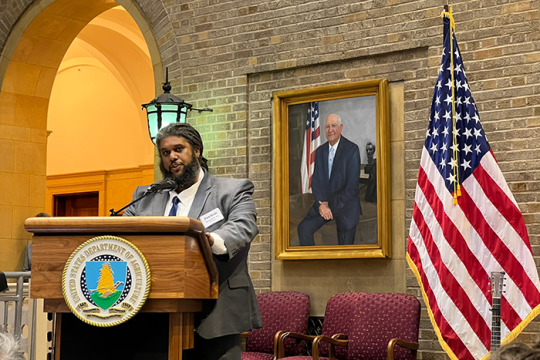
Remarks from the U.S. Department of Agriculture’s Jewish American Heritage Month Event
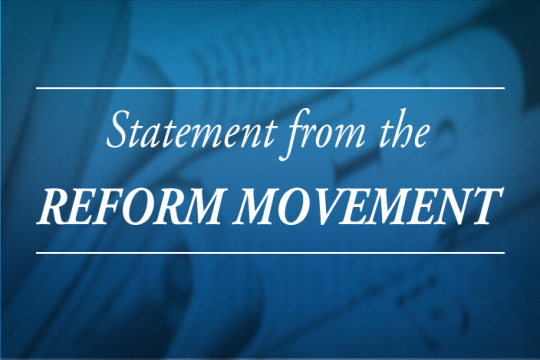
A Letter to the 118th Congress
